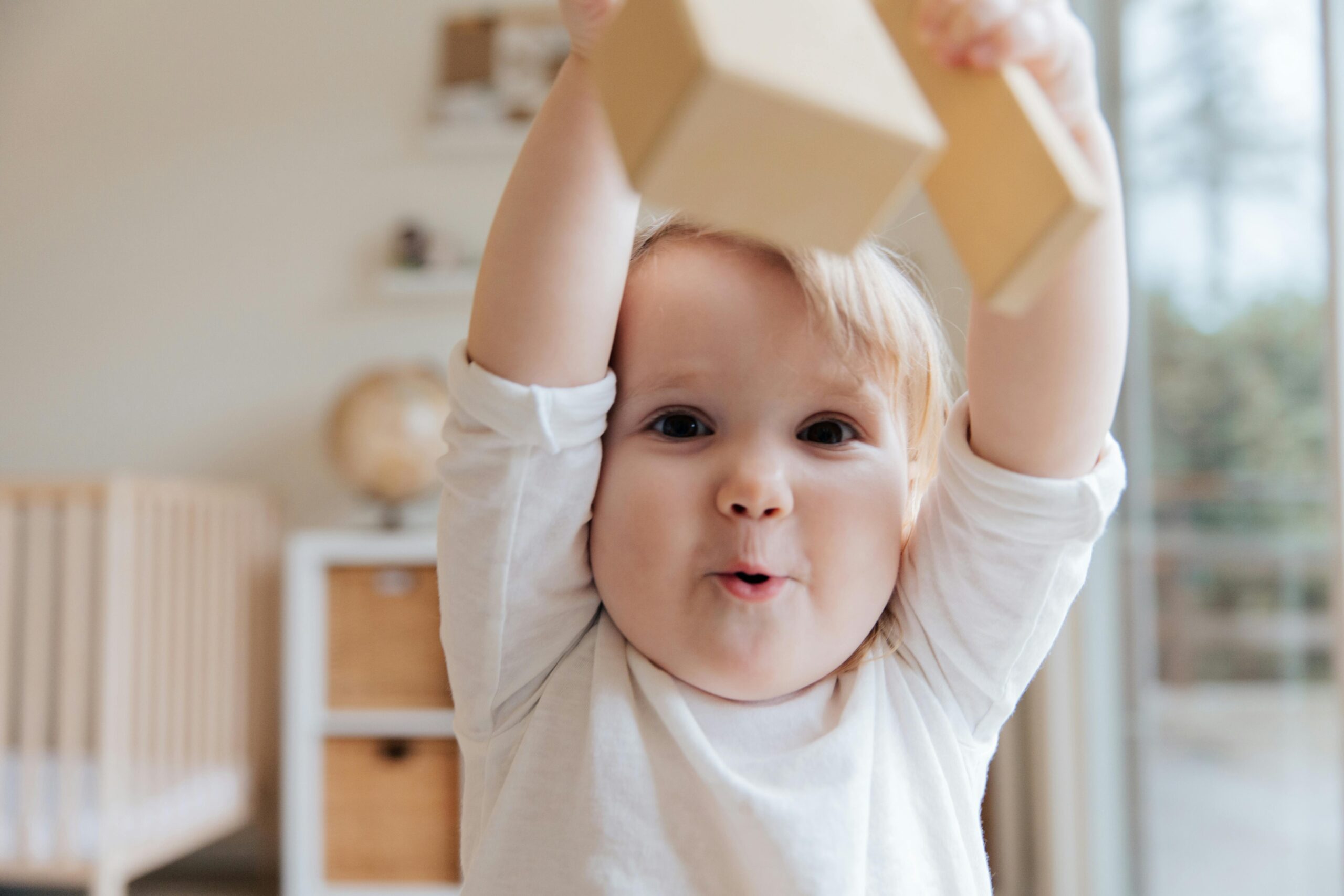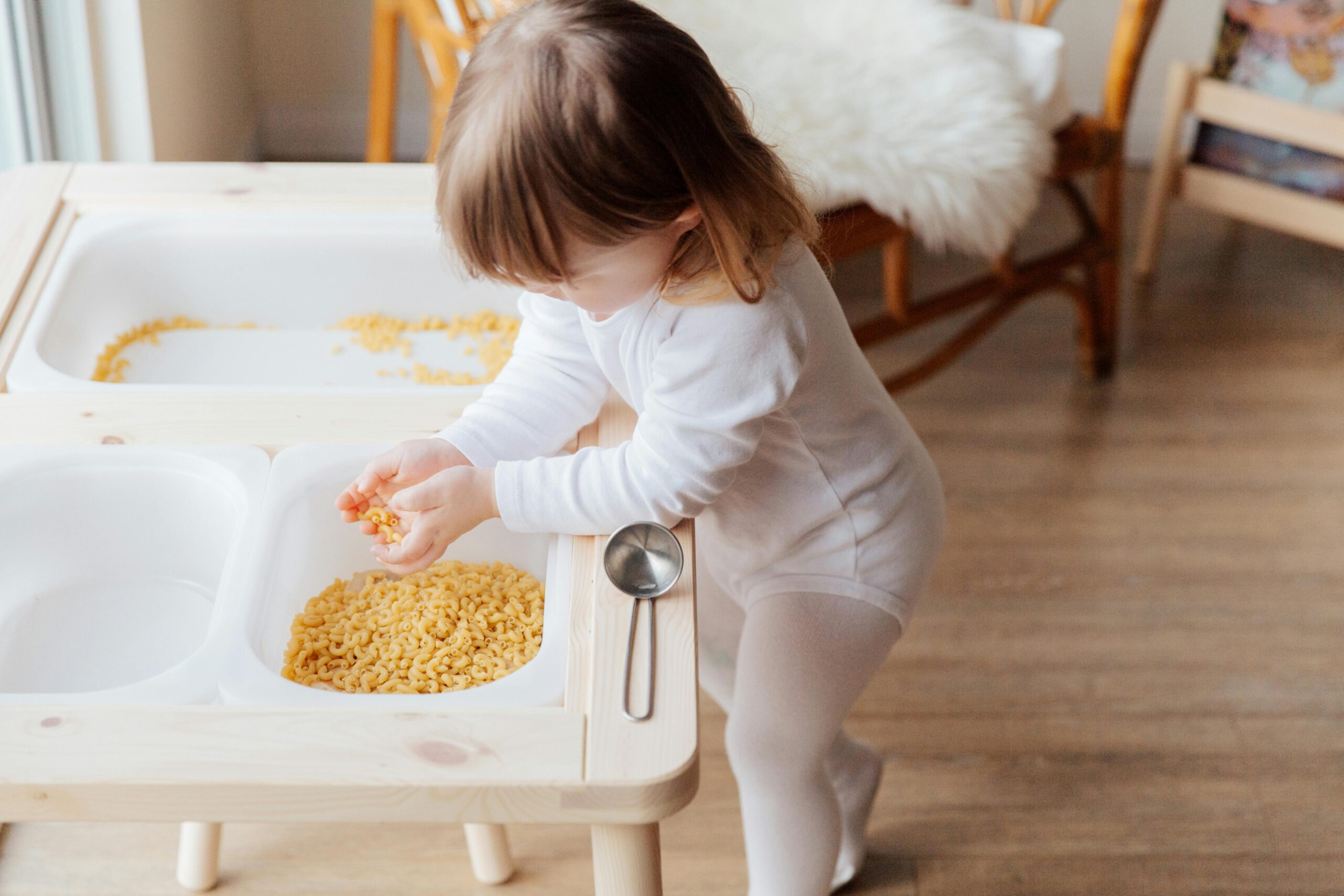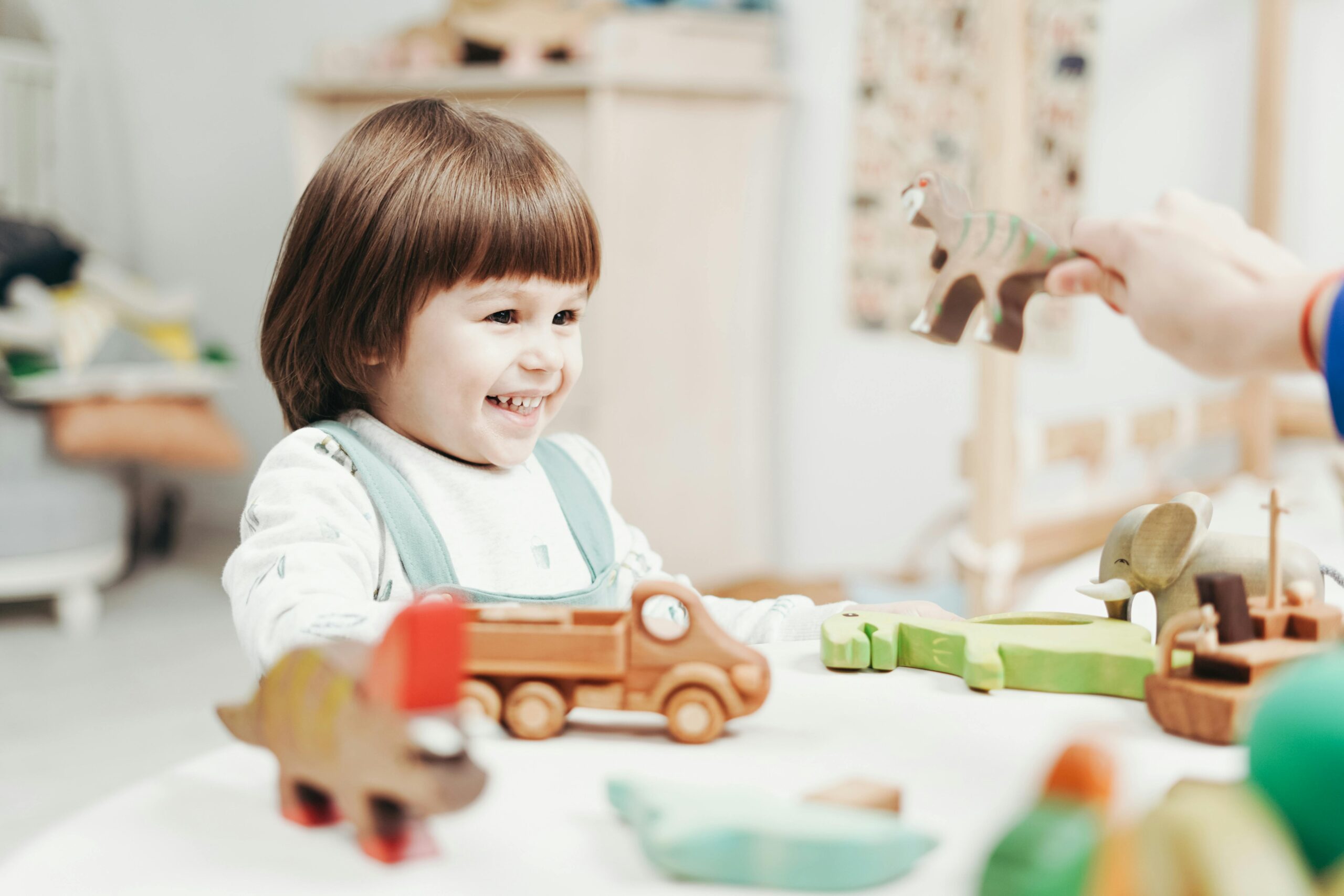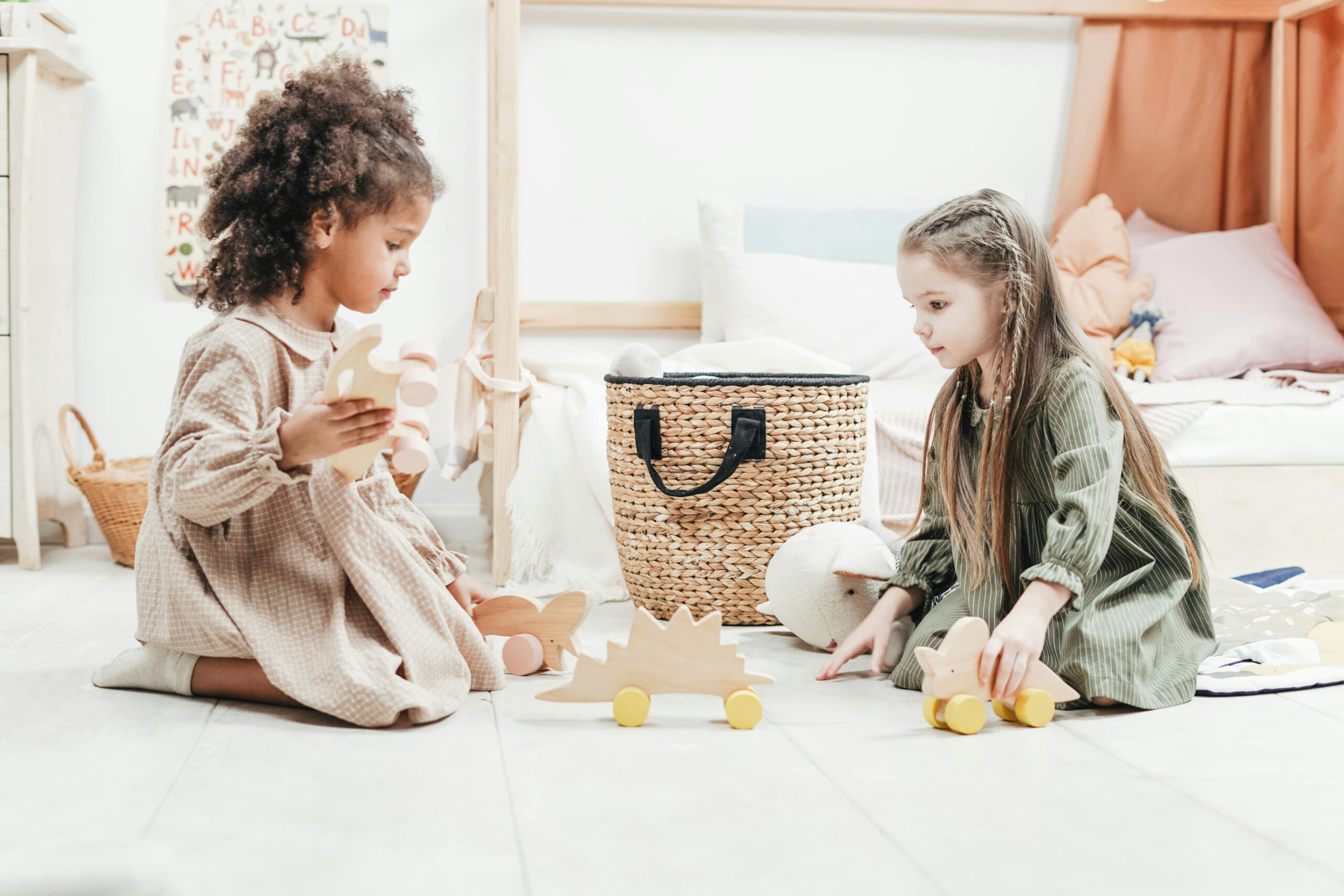Play milestones in early childhood & how to play with your child to promote development
Play is incredibly important for the developing brain in early childhood. In fact, did you know that only about 25% of the brain is developed at birth? In early childhood play helps us develop communication & language skills, motor planning, visual perception, problem solving skills, emotional intelligence, and executive functioning skills. These skills are needed throughout our whole life & impact our ability to have meaningful relationships, find success at school/work, be independent, and more. So what can you do to help your child meet their play milestones in early childhood? Keep reading to find out.
Table of Contents
- Play & Brain Development – The Science Behind Play
- Play Milestones From Birth To Four Years Old
- How To Play With Your Infant To Promote Development
- How To Play With Your 1 Year Old To Promote Development
- How To Play With Your 2 Year Old To Promote Development
- How To Play With Your 3 Year Old To Promote Development
- How To Play With Your 4 Year Old To Promote Development
Play & Brain Development – The Science Behind Play
Before we dive into the research about play & brain development, it’s important to note that most studies on this topic have been done on animals. With that said however, the research does provide valuable insight into the impact play has on the brain & our well being. Now that that is out of the way, let’s dive in!
Play directly impacts brain structure & functioning. There is a growth factor in our brain called Brain Derived Neurotrophic Factor (BDNF). BDNF is responsible for keeping our existing neural pathways healthy & supports the growth of new neural pathways in our brain. Additionally, BDNF is responsible for long term memory & social learning. Aaaand – research shows that play stimulates BDNF production (PMID:12676333).
Play promotes good mental health. In an animal study, young animals that were void of play in early life were more likely to suffer from depression, have higher levels of cortisol (stress hormone), and lack problem solving & social skills. (American Journal of Play)(PMID: 19150054) (PMID: 10212056)(PMID: 658602)
In another study, children ages 3 – 4 years old that were anxious on the first day of preschool were randomly chosen to either participate in a 15 minute free play session or a reading session with the teacher. At the conclusion of the study, children that participated in the play session were found to have decreased stress levels when compared to the children who participated in the reading session (PMID: 6746795).
Play Milestones In Early Childhood (Birth – 4 Years Old)
Below are the typical play milestones in early childhood. You may notice that there is some overlap – that is because each child is different! These milestones are used as a general guideline. Depending on your child it might take them longer to develop certain play skills than others – and that’s ok! If you are concerned about your child’s development we encourage you to reach out to a pediatric occupational therapist for further support.
Unoccupied Play (birth – 3 months old)
At this stage your child should be making lots of movements with their arms, legs, hands, & feet. By moving their bodies they are learning about their body & discovering how it moves.
Solitary Play (birth – 2 years old)
At this stage your child generally is not interested in playing with others quite yet. They usually gravitate towards playing by themselves.
Spectator/Onlooker (2 years old)
At this stage your child will begin observing and watching others play, but they will generally continue to play by themselves.
Parallel Play (2+ years old)
At this stage your child will play alongside, or near others, but they do not play with others.
Associate Play (3 – 4 years old)
At this stage, your child will start to interact with others during play, but there is not a large amount of interaction. Your child might be doing an activity related to the kids around them, but they might not actually be interacting with the other children. For example, a group of children might all be playing on the same piece of playground equipment, but all doing different things like climbing, swinging, etc.
Cooperative Play (4+ years)
At this stage your child will play together with others. They will have an interest in both the activity & the other people involved in playing.
How to Play With Your Child to Promote Development & Meet Play Milestones In Early Childhood
When it comes to playing with your baby to promote their brain development, really all it comes down to is having fun! Make sure there is plenty of unstructured & unplanned time in your schedule to encourage creative thinking. Prioritize time for active play – aka opportunities where your child can use their muscles. This could look like swinging, jumping, climbing, dancing, ect.
In the early years it’s important to remember to praise your child for trying, not necessarily for doing an activity successfully. And most importantly – be playful with your child! Playing with your child will help you build a strong, safe relationship with each other.
Below we have brainstormed specific ways that you can play with your child to encourage early childhood development. Use this list as inspiration for your next play session!

How To Play With Your Infant To Promote Development
Play at this stage is primarily in the form of attunement. Attunement is the process of the parent/caregiver reading & responding to the baby’s nonverbal cues. This is really big at this age as it forges a strong connection between you and your baby.
- Make eye contact, get close to them, talk to them in a quiet soothing voice.
- Put your baby in different positions – on their sides & on their tummies at an inclined position (specific instructions inside The Parent Playbook – click here to download). Holding your baby in different positions is helpful because it helps your baby learn how to move against gravity, builds muscles, and stimulates the brain.
- Give your baby massages – squeeze their shoulders, rub their hands, & stroke their legs to stimulate the nervous system.

How To Play With Your One Year Old To Promote Development
- Model how to play to them – show them how to stack cups, roll cars/toys, shake rattle, ect.
- Sing & talk to your baby
- Encourage them to crawl & move – this is incredibly important! If your child is having trouble with crawling, consider reaching out to an OT.
OT Recommended Developmental Tools

How To Play With Your Two Year Old To Promote Development
- Model play, and then invite them to join. For example, build/stack cups then knock them down. Then build/stack the cups in front of your child so they can knock them down.
- Playing at this stage is pretty simple. They don’t have to follow specific rules, and the goal isn’t for your child to do exactly what you do. You are just encouraging interaction.
- Crawling is still incredibly important at this stage. Encourage them to crawl to toys, under blankets, through tunnels, under tables, ect. Crawling with their hands open also develops their grasp muscles.
OT Recommended Developmental Tools

How To Play With Your Three Year Old To Promote Development
- At this stage your child is just beginning to learn how to share or take turns, so they don’t know how to do this well just yet. Help them learn by modeling these kinds of interactions to them when you are playing with them. When you are playing together say ‘my turn’, then take a super fast turn with whatever toy you guys are playing with. Then say ‘your turn’ and give them a chance to play with the toy.
- Practice doing things together. Help them learn how to communicate by saying ‘I need help, can you help me? Can you put this block on top? Can you pick up the doll?’
- Start jumping – jumping up/off of objects. Jumping repeatedly (or in a sequence) requires more skill that is not typically developed at this age.
OT Recommended Developmental Tools

How To Play With Your Four Year Old To Promote Development
- At this age your child can participate in slightly more dynamic building. Encourage them to explore with building blocks, magna tiles, cardboard boxes, legos, etc.
- Help them develop their grasp & hand muscles by digging with them in the sand box or in dirt, collecting sticks/rocks (and holding them in their hands), making mud pies – don’t be afraid to get dirty, kids are washable!
- Provide opportunities for them to climb – climbing onto a rock or bench, or climbing up the slide (safely!)
OT Recommended Developmental Tools
Play is incredibly important for your child – especially in the younger years. As Mr Rogers says, “Play is the work of childhood”, so make sure you are prioritizing the different types of play mentioned in this post. There’s no need to overcomplicate it, just get out there and have fun!
Want more info about your child’s development?
In our free download ‘The Parent Playbook’ we provide more detailed information about what to prioritize in the first four years of life to promote brain development. This guide will help you know what to expect, and give you specific tips to support your child.
*This post contains affiliate links
Want to know more about sensory processing, self regulation, child development, & more? Our resource library is full of free crash courses, guides, and tools to help you understand more about your child & how you can support them outside of therapy.
Get your free resources!
show me the resources